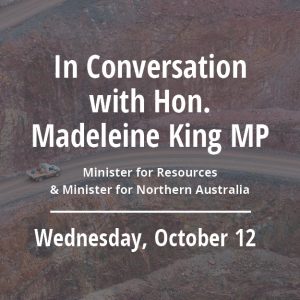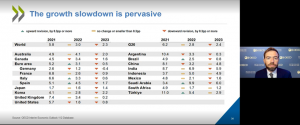Australia is better positioned to weather the global storm of rising inflation and weaker growth as a result of a strong resources sector that is fueling the domestic economy, according to the Organisation for Economic Cooperation and Development.
In the second of a three-part webinar series between the CCIWA and OECD, Ben Westmore, head of the Australia and United States desk, said the legacy of pandemic assistance programs and pivoting consumer demand; disruptions to supply chains; and the war in Ukraine were the main drivers of global inflation. 
Meanwhile, inflationary pressures had become more broadly based — that is, the ‘inflation basket’ of products was expanding — and tight labour markets were pushing up wages.
Of particular concern, Westmore said, was that in the US and some other economies, services inflation, which accounts for about 50 per cent of the ‘basket’, was starting to pick up.
However, he said that this was not yet as noticeable in Australia, and the country had similar experiences to other OECD countries, with a 20-year-low unemployment rate, supply chain disruptions, higher energy prices, and labour costs on par with the euro area.
Short-term inflation expectations for Australia had opened up sharply to sit around 5 per cent, while longer-term financial market expectations from inflation index bonds were in the 2-3 per cent range.
“Our judgment would be a lot of these general global factors are having a similar influence in Australia,” he said. “There are some idiosyncratic factors, but in general it’s these global influences that we’re seeing across OECD countries that are also present in Australia.”
Commodities exports
However, Westmore said the increased commodity prices that had negatively affected many OECD member countries had fueled an increase in key commodities exports in Australia.

On a negative note, Australia had a very high share of variable rate loans in the economy, which exposed households to rising interest rates. But this was offset by household savings that provided “a buffer in most households”.
The OECD yesterday (September 26) released its Economic Outlook, Interim Report September 2022, saying the world economy was paying a high price for Russia’s war against Ukraine, which coupled with the lingering impacts of COVID-19, was dragging down growth and putting additional upward pressure on prices — above all food and energy.
READ: China growth weakened amid multiple challenges: OECD
The report said despite a boost in activity as COVID-19 infections drop worldwide, global growth was projected to remain subdued in the second half of 2022, before slowing further in 2023 to an annual growth of just 2.2 per cent.
The report’s four main takeaways were:
- The world economy is slowing more than anticipated
- Inflation has become more widespread
- Inflation will ease but remain at high levels
- Demand reduction and supply diversification are needed to avoid energy shortages
During the CCIWA-OECD webinar, Westmore identified global economic risks to the OECD’s projections as:
- Gas shortages in Europe (downside)
- Headwinds in the Chinese economy (downside)
- Adverse consequences from rapidly rising interest rates (downside)
However, an upside risk was the thawing of supply chain bottlenecks, which “may start to show up in terms of lowering inflation”.
Advice to policymakers
Westmore said the OECD’s advice to policymakers was to tighten monetary and fiscal policies while providing targeted stimulus programs to “those groups that really need it most”.
Its forecast for Australia and the US was a “soft landing” whereby interest rates increase and inflation comes down.
“We do have a slowdown in economic growth below what we might consider to be the potential growth rate of the economy, but we don’t see a big recession in any of these economies,” he said.
“But that’s a pretty optimistic sort of scenario from where we stand at the moment.”
For access to webinars like this, join CCIWA via 1300 422 492 or [email protected].







